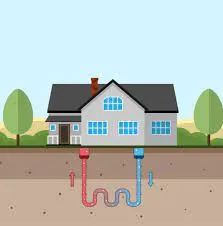As the world becomes more conscious of the impact of carbon emissions on the environment, homeowners are seeking sustainable and eco-friendly solutions for their homes. One of the options gaining popularity in this regard is geothermal energy. In this guest post, we will discuss what geothermal energy is, how it can be harnessed for residential use, and the benefits of using geothermal energy for homes.
What is Geothermal Energy?
Geothermal energy is a type of renewable energy that harnesses the natural heat energy of the earth's core. The earth's core is a hot, molten layer that produces heat energy from the decay of radioactive materials. This heat energy is transferred to the earth's surface through convection and can be harnessed for various purposes.

In the case of residential geothermal energy, the heat energy is used to regulate the indoor temperature of homes, providing heating in the winter and cooling in the summer.
How is Geothermal Energy Harnessed for Homes?
Residential geothermal energy systems consist of a looped pipe system that is installed underground, either vertically or horizontally. This pipe system circulates water or refrigerant through it, absorbing heat from the earth in the winter and releasing heat into the earth in the summer. The absorbed or released heat is then transferred to the building's heating and cooling system, providing a comfortable indoor temperature throughout the year.
The system's efficiency and effectiveness depend on the design and installation of the geothermal loop system, which can vary depending on the site's soil and rock composition, depth, and water availability. However, properly installed systems can offer significant energy savings and a more comfortable indoor climate.
Benefits of Geothermal Energy for Homes
- Cost-effective: While the initial installation costs may be higher than traditional heating and cooling systems, geothermal energy systems offer significant energy savings over time, making them a cost-effective solution for homeowners.
- Sustainable: Geothermal energy is a clean and renewable energy source, reducing reliance on fossil fuels and lowering carbon emissions.
- Efficient: Geothermal systems are highly efficient, providing up to 50% energy savings compared to traditional heating and cooling systems.
- Comfortable: Geothermal systems provide a more even and consistent indoor temperature, eliminating hot or cold spots commonly found in traditional systems.
- Low maintenance: Geothermal systems require minimal maintenance and have a long lifespan, making them a cost-effective investment in the long run.
Conclusion
Geothermal energy offers a sustainable and cost-effective solution for homeowners seeking to reduce their carbon footprint and energy bills. With minimal maintenance and a long lifespan, geothermal systems are a smart investment in the long run. As the world becomes more conscious of the environmental impact of traditional HVAC systems, geothermal energy offers an eco-friendly and effective alternative.
FAQs
- Is geothermal energy suitable for all types of homes?
- Yes, geothermal energy can be harnessed for all types of homes, from single-family houses to multi-story apartments. However, the design and installation of the geothermal loop system may vary depending on the site's soil and rock composition, depth, and water availability.
- What is the lifespan of a geothermal energy system?
- Geothermal energy systems have a lifespan of over 25 years, making them a durable and long-lasting investment for homeowners.
- Can geothermal systems work in colder climates?
- Yes, geothermal systems can work in colder climates, providing heating in the winter and cooling in the summer. However, the system's efficiency may depend on the design and installation of the geothermal loop system, which can vary depending on the site's soil and rock composition, depth, and water availability.






